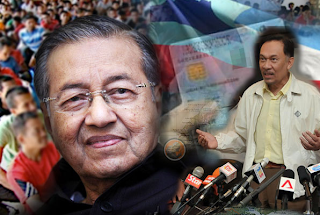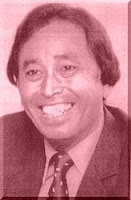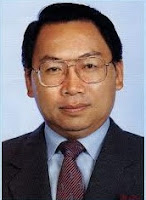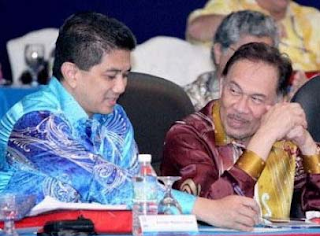In discussing issues on Sabah, one must differentiate between the voices of the people or rakyat and polemics of politicians. Even the term rakyat can be an overused term and bordering on cliche.
When PKR, PAS and DAP made headway in the 2008 general election, Dato Seri Anwar Ibrahim claimed it is peoples' uprising or kebangkitan rakyat.
However, it was not across-the-board rakyat but mostly Chinese voters shift for DAP and Chinese PKR candidates at the cost of MCA and Gerakan. So, the so-called kebangkitan rakyat only involved Chinese.
Same with the controversial and at times, provocative views from Sabah towards Semenanjung or the federal government. The politicians claim it is the voices of the rakyat but it does not emanate from Sabahans. It is merely Sabah politicians' seditous campaign in their quest for power.
In the same note, the on-going Royal Commission of Inquiry (RCI) is not likely about seeking the truth or reconciliation with the past but to lay blame on their past "defeat" from the real reason to the immigrant naturalisation exercise.
That way they could reuse this old campaign theme.
Sabahans
Having made regular trips to Sabah since the 1990s, more had been learnt and appreciated of Sabah and Sabahans. They are nice, friendly and embracing people. It is their politics and politicians that is problematic.
Since the 90s, their politicians have been spewing views that does not serve our nation building objective with their insular-themed slogan Sabah for Sabahans; us-against-them attitude behind the complains and accusation of oppression against the federal government; infringement of the "mythical" 20 point agreements; and call for cessation out of Malaysia.
It also does not reflect the aspiration or the attitude of the Sabahans. Our friend, whose married to a Sabahan from Keningau and wish to retire in Sabah, refused to believe Sabahans wants to opt out of Malaysia to be either an independent state or part of Indonesia or Phillipines or Brunei.
At the people-to-people level, Sabahan are more open and accept the presence of Semenanjung people in Sabah than perhaps a Kelantanis to non-Kelantanis Semenanjung.
Without Semenanjungs, Sabahan could not fill-up basic positions like teachers, soldiers, police, fireman, and nurses to enable such public services available to the people.
Even the Universities and colleges need Semenanjungs to fill the positions of lecturers. Sabahan could only fill up only one third of University Malaysia Sabah's annual enrollments. Some private colleges in Sabah cannot get sufficient enrollment despite the more relaxed entry requirement for Sabahans.
More than the politicians realised, there had been marked increase in interactions and integration between Sabah and Semenanjung. There are quite a high number of inter marriage and migration between Sabahan and Semenanjung. Notice the packed LCCT and filled up flights to and from Sabah on weekend.
Some of the more national outlook Sabahan realised they can rely on the Semananjung better than their Sabah politicians. The business community viewed the politicians as having raped the state dry.
They understand Sabah need to maintain good relation with the federal government as they rebuild their economy away from forestry into other sectors like agriculture or tourism.
Political Defection
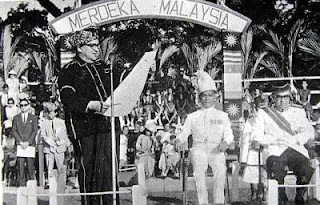 |
| State independence declaration in 1963: Tun Datu Mustapha Harun in centre |
After serving United Sabah National Organization (USNO) since 1963 and was in the late Tun Datu Mustapha's Sabah cabinet as Minister of Finance in 1967, now Tan Sri Harris Salleh was in a crisis with the dictatorial independence fighter Sabah Chief Minister.
Harris formed UPKO and later turned it into multiracial BERJAYA. He was the party's first president in 1973. By collaborating with then Yang Dipertua Negeri Tun Fuad Stephen who resigned to join BERJAYA, they managed to wrest from USNO.
Tun Fuad became Sabah's Chief Minister again as it's fifth Chief Minister. However he died in a place crash in June 1976 and Harris replaced him as Sabah's sixth Chief Minister.
Few years before the 1984 state election, Harris faced challenges to his leadership. However, he managed to win the 1984 state election winning 44 out of the 48 seats.
His actions against his challengers prior to the 1985 state election resulted in few Kadazan assemblymen and supporters led by Dato Joseph Pairin Kitingan to leave BERJAYA and form Parti Bersatu Sabah (PBS).
In the state election in 1985. BERJAYA lost power to PBS and Pairin became 7th Chief Minister of Sabah. Read more in Wikipedia here.
Many believed the problem of Harris was his temperament and increasingly dictatorial, the same accusation he made of the man he opposed before, Tun Mustapha.
The man who led his downfall, Pairin was a member of the Sabah Legislative Assembly for the Tambunan electorate.
He won the seat in the 1976 state election under the BERJAYA party ticket and was subsequently appointed as Minister in Harris cabinet.
The edited extract from Wikipedia here, below:
Over time, Joseph Pairin became disillusioned with the party's leadership, and opposed some of the party's policies. He felt that the party had deviated from its original struggle.
He however, remained firm with the party but subsequently, had to leave the ruling party coalition in 1984.
Leadership
In December 1984, he ran as an Independent candidate against the ruling party to defend his seat in the Tambunan by-election.
Joseph Pairin easily won and defended his seat with significant majority.
In March 1985, Joseph Pairin Kitingan formed Parti Bersatu Sabah (PBS) or United Sabah Party. Despite overwhelming odds, he succeeded in registering PBS as a political party in the eleventh hour and contest against the incumbent state government in the Sabah state election in April 1985.
BERJAYA and Tun Mustapha's USNO joined forces to win the 1985 election, but after riots, the newly formed coalition between BERJAYA and USNO were at odds and dissolved, thus giving PBS the majority government.
Pairin sworn in as the seventh Chief Minister of the state of Sabah. He held the post of Sabah Chief Minister from April 1985 to March 1994, during which he spearheaded his party's triumphant outings in four successive state elections (1985, 1986, 1990 and 1994).
In the 1994 state election, PBS won the election, however shortly after being announced the winner, almost all PBS assemblymen defected to Barisan Nasional.
Pairin was not sworn in as Chief Minister but Tun Sakaran Dandai of UMNO was then sworn as the eighth Chief Minister of Sabah.An important point from the Wikipedia on PBS, here as extracted below:
Following the 1986 Sabah riots, PBS joined the Barisan Nasional (BN) coalition after winning the May 1986 state election.
However, on the eve of the July 1990 state election, PBS pulled out of the coalition and won the state election for a third time.
It also won the 1994 state elections by a narrow margin. However, numerous defections occurred as many PBS representatives switched allegiance to BN before PBS could form a new state government.
PBS only rejoined BN in 2002, ending any form of opposition as BN fully occupied the state legislature and holds the federal parliament.From the historical brief, PBS was never robbed of power through the ballot box. But through the Sabah styled political manouvre of Sabah UMNO. PBS lost power in Sabah not because of any alleged electoral manipulation of the 1994 state election but due to defection.
The exercise had no impact to the election outcome. Thus, there is no real basis to accuse the naturalisation of illegal immigrants exercise as the cause for denying PBS the much due power.
Interestingly, the pre-election defection by Pairin in 1984 became a similar manouvre replicated by Sabah UMNO to deny PBS power in 1994 and PBS backstab of BN by doing an 11th hour withdrawal in 1990.
Anwar Ibrahim
Azmin reacted by accusing the RCI as meant to fix his beloved. In The Malaysian Insider's here, Azmin claimed he was tipped by sources that the RCI was meant to implicate Anwar Ibrahim.
Clearly Azmin was trying to pre-empt the RCI but had accidentally opened Anwar's Sabah Pandora Box. He affirmed Gelagat Anwar blogs's insider information.
The fact is Anwar Ibrahim was the Barisan Nasional Director of Election for the 1994 Sabah state election that maounvred the defection. Who does not know that Anwar orchestrated the buying over of PBS State Assemblymen to seize power from PBS through defection?
And he is still trying to repeat the same predicted defection game before the election.
At one time, he was drumming up sentiment as though there will be 18 defection soon. No one fell for it including those with intention to defect. If they do attempt, it will be after election game. Dato Najib should just not allow them to run as candidate.
It is an urban legend in Sabah that the promised amount of RM2 million to the defecting PBS assemblyman was short paid and promises of Chief Minister's post to several assemblymen was not fulfilled.
Among the assemblyman involved in that defection are Dato Lajim Ukin, Dato Wilfred Bumburiang, Dato Majol Mahap, Tan Sri Bernard Dompok (now UPKO), and Tan Sri Joseph Kuruk (now PBRS).
Lajim and Wilfred is still with their defection habit as they left UMNO and UPKO.
Azmin's pre-emptive game will not work. Kadir Jasin remember it well in his latest post, Anwar: Exocising the ghost of his UMNO's past. He wrote:
In the case of Sabah politics, in which the immigrants play a major socio-economic and political role, Anwar was for many years its key handler. Because he was one of the most trusted and ambitious allies of then Prime Minister, (Tun) Dr Mahathir ‘the Wizard’ Mohamad , he got to handle not only Sabah politics but also money that went with it – government as well as party money.Anwar defeated the late Ghaffar Baba for Deputy President of UMNO in before denying iwas the key handler of Sabah
When RCI was formed at the behest of Dompok [read this December 2011 Malaysian Digest report here], Anwar was quick to dismiss the RCI as "to protect the hands behind the "voting immigrants." [read MI August Bahawa Malaysia report here].
One only need to remember that Berita Harian's August 13, 2012 edition reported by Dato Dr Chua Soi Lek telling Anwar that he remembers the event well to know the reason he pretended to dismiss the Inquiry. [Read the blog Pewaris Anak Bangsa here]
Another RCI
In his August statement, Anwar claimed Dr Mahathir will shiver when the RCI call him in as witness. Azmin also laid the blame on Dr Mahathir by claiming that National Registration Department, Immigration and various agencies related to issuing of IC was under him as Home Minister.
So far the old man has remained cool. When asked by reporters last week, he readily admitted that the illegal immigrants were given citizenship and the process were done in accordance with the law and procedures.
He explained that Sabah is the homeland for these so-called illegal immigrants and are indigenous people of the area.
If he was accused as committing treason for giving citizenship to these political refugees, then there should be an RCI on Tunku Abdul Rahman's action for giving citizenship to one million immigrants.
In Permatang Pauh, he explained further that the citizenship given to immigrants by Tunku Abdul Rahman was not done in accordance to the rule.
He made a critical attack on those citizens who benefited then from the Malays generosity but now insist on taking what little protection the Pribumi had put in place without taking anything from economy dominating naturalised immigrants.
Read Bigdog's report here on the Perkasa event in Permatang Pauh. Already Gelagat Anwar here claimed Anwar is now in a state of paranoia following the big attendance. Anwar has been having problem pulling in crowd for ceramah at Permatang Pauh.
To rebut Dr Mahathir's counter attack, Dr Aziz Bari claimed it as contradiction to the Social Contract. Anwar Ibrahim and Lim Kit Siang echoed the same argument. Suddenly Lim Kit Siang find it convenient to accept the concept of Social Contract.
Bigdog's latest posting here explained further Dr Mahathir's point. He claimed Tunku breached the Perlembagaan Persekutuan Tanah Melayu or the 1948 Constituition of Malaya as laid down by the Malay rulers and assisted by the British Governor as adviser.
This was the Constitution drafted to change the Malayan Union of 1946 that UMNO led it's opposition.
On-going concern
In addition to the argument that PBS never lost power to the Harris Salleh disclaimed "project IC", the naturalisation exercise was not planned as illegal votes for 1994 but had been an ongoing concern as early as the formation of Malaysia in 1963.
Phillipines had opposed to the formation of Malaysia and claiming Sabah as their own based on the same argument that the people of Sabah are the same indigenous people found in Mindanao, Sulu and Palawan islands.
At the same time, Phillipines had been at war against the Bangsamoro since the days of Spanish and American rules. It had been going on for more than 100 years since the Bangsamoro resisted attempt the Spanish's forced conversion to Christianity as they did in South America and Grenada.
Sabah became a natural destination for the Muslim population to fled the war of Southern Phillipines. As Apanama argued:
The ongoing RCI on Immigrants in Sabah could be a vital step forward in addressing the issue of illegal immigrants but we must never allow politicians to hijack the RCI for their narrow, racists and extremists politics.The point here is that the naturalisation exercise is not targeted for the 1994 ouster of PBS but an ongoing exercise.
If everybody starts questioning each other on who is more 'original', we may end up being forced to give ID papers and citizenship to the Orang Utans in Sepilok and their cousins who are still roaming the rainforests'... for I'm sure they're the undisputed 'original' inhabitants of the Land Below the Wind.
Priot to 1994, the naturalisation exercise had involved phases from as early as 1979-1984 for state registration exercise involving 51,000. Then there was the 1989-1991 phase that involved 61,000.
The 1993-95 period which coincide with the 1994 state election only involved 16,000. This was also the phase that those involved of blackmailing money from immigrants shortlisted for citizenship or selling blue ICs by NRD officials were detained under ISA.
Subpoena
Now that the major points are explained, what is to be done on Anwar Ibrahim.
Not by BN, but a call by another of Sabah's opposition party, STAR led by Dato Dr Jeffrey Kitingan is relevant. One of it's official called on the RCI to subpoena Anwar Ibrahim to give statement as witness.
It was reported in the Daily Express and Express Harian dated January 19th, 2013 below:
Richard Jimmy called Azmin Ali's bluff to pre-empt any possible subpoena by accusing UMNO as attempting to fix and implicate him. How is he to hide the fact that anwar Ibrahim was the Director of Election for BN in the 1994 Sabah state election.
If Dr Mahathir is willing to be called and give statement, why should Anwar who was involved in the 1994 state election be exempted?
Sabah had been former Deputy UMNO President, Tun Ghaffar Baba's portfolio. It was only appropriate that he be given the portfolio to monitor Sabah affairs since he had amassed network and influence in Sabah to oust Ghaffar in the UMNO election of 1994.
It is typical of Anwar Ibrahim to accuse other for his own past "crime". He knows that the Sabahan public will be reminded of his past actions by his current attempt to repeat the same manouvre and with the same set of people.
If the RCI is sufficient for the opposition to exploit and orchestrate another post election defection, will Bernard Dompok, the UPKO President also be following the suit of his former Deputy President, Bumburiang?
Dompok was vociferous for the formation of RCI. [Read FMT here.]
He will have to rethink hard if Anwar is brought to the RCI.
One thing for sure, PBS is unlikely to follow those who betrayed them before. At his late age and sickness, pairin will not want to be remembered in history as betraying BN the second time. Furthermore, Pairin will not forget what Anwar did to him.
Unless Pairin withdraw from the running in the upcoming general election, PBS will remain steadfast with BN and Musa Aman due to a special tie between Pairin and Musa.
Edited: 24/1/2013 1:00 AM
